DonQui found himself in Mtwara a few months ago. Planned as a deep water port for disastrous Tanganyika groundnut scheme in the 1940s, the town is now rapidly becoming the oil and gas capital of Tanzania since the discovery of huge natural gas reserves off shore. Therefore it is not surprising that DonQui shared the Precision Air flight from Dar es Salaam with a load of British, Norwegian, Canadian, American and Chinese oil & gas boys.

Just short of the Mozambique border, Mtwara is not on most visitors’ destination lists when they think of going to Tanzania. To be truthful DonQui cannot think of many reasons to visit other than to experience a part of the country that few tourists ever see.
The town itself has no attractions and there is tension between the locals and the government which has occasionally erupted into violence. A gas pipeline is being built from Mtwara to Dar es Salaam, causing disruption while the economic benefits will go to Dar, bypassing the locals.

The one decent hotel in Mtwara, the Naf Beach Hotel is rather expensive for what it offers and is… well… a little naff. The view over the Indian Ocean is wonderful but the beach is for looking at rather than experiencing.
Just a little to the north of Mtwara, however, is Mikindani — an old port town that was once a major trade centre on the Swahili coast. Mikindani was the staging point of David Livingstone’s last African expedition and was an important port of German East Africa.

Today the town has shrunk to little more than a village but it retains some of the best Arab and European colonial architecture to be seen in Tanzania outside Zanzibar. A couple of buildings and the Arab cemetery date back to the 17th century.

The jewel in Mikindani’s crown is surely the Old Boma (old fort). Once the centre of German East African administration in the region, later taken over by the British, it fell into neglect and ruin in post colonial years. At the turn of the millennium a UK charity —Trade Aid — lovingly restored it.

The signs left by both European colonial occupiers are preserved in the tasteful restoration which has transformed the old fort into a hotel with the aim of teaching local youngsters the skills needed to find employment in Tanzania’s tourism sector.So now the grand Old Boma is both a boutique hotel and a training facility. Overseen by the ebullient Harry MacEwan, the staff learn the hospitality trade, improve their English language skills and many go on to find jobs which will take then from subsistence living to far greater opportunities.
DonQui stayed at the Old Boma for a couple of days and thoroughly enjoyed himself. The building is utterly unique, the setting wonderful and although the service was at times erratic — a function of the fact that is a training establishment — he highly recommends spending a few days here if you have any sense of history and are looking for peaceful tranquility. The food is pretty good too and they even make their own honey on site — produced by tiny, stingless bees.

The Old Boma provides a number of excursions. DonQui took them up on an offer of a trip to the white sands and coral reef of Msimbati beach on the Mnazi Bay Marine Reserve —very close to the Mozambique border.

Setting off in a rickety old land rover with two local boys and a packed lunch, the 35 mile trip took a couple of hours along a dirt road.

Passing through lush forest, rice paddies and several ramshackle villages the trip gave DonQui the opportunity to view rural Tanzania which is a world away from the bustle of Dar es Salaam. He was shocked to see that all the manual labour in the rice paddies and on road construction sites was almost universally done by women. Bowed low under their burdens they toiled in the sun while their men sat in the shade and apparently did very little. An urban Tanzanian friend later sorrowfully told him that the women would be expected to cook a meal for their idle menfolk on return from their labours.

Signs of the omnipresent Chinese investment to extract African natural resources were also plain to see when the forest suddenly gave way to an oil and gas facility.

Msimbati was about a close to beach paradise as DonQui could ever hope to find. He had the fine sand beach entirely to himself. The day was cloudy and there was an easterly breeze which made the 35º heat rather pleasant.

The water was warm and crystal clear with a teaming coral reef just off shore which made for a near perfect snorkelling destination. The two young men who accompanied him, set up a small table and sun shade where he could retreat from the noon day sun and enjoy the very good packed lunch which the Old Boma had provided. Spicy samosas, fresh salad, pineapple and mango seemed just about the perfect lunch on a hot afternoon.

On his return to Mikindani DonQui took a walk down the road, stopping several times to photograph the local children, all of whom insisted on seeing themselves on his camera. None of them spoke any English apart from the following words: “photo” and “Manchester United.” As a creature with no interest in football what so ever, DonQui despaired at what appears to have become Britain’s most popular export.

Navigating his way through the local pint size paparazzi magnets, DonQui’s destination was Ten Degrees South. Dive centre, bar, restaurant and simple hotel, Ten Degrees South is the antithesis of the relatively upmarket but quiet Old Boma. Gathered around the bar, overseen by an expat Canadian doctor, were a lively mix of oil boys on leave, NGO girls taking a break from doing good works, scuba divers returning from exploring the reefs and even a couple of locals.
It was the perfect place to sip on a beer or two and exchange gossip with the eclectic mix of multi-national customers
-10.282329
40.111989
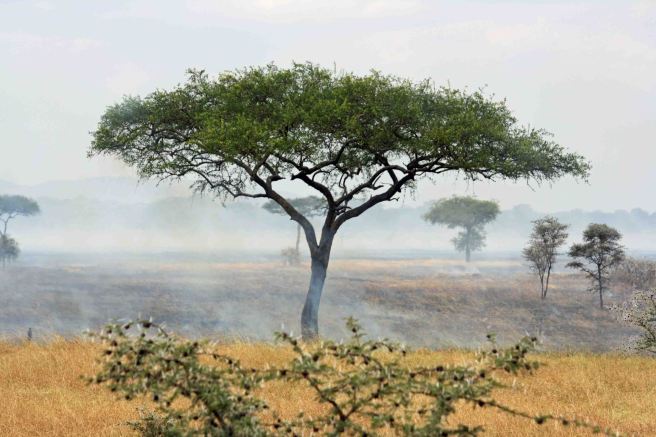
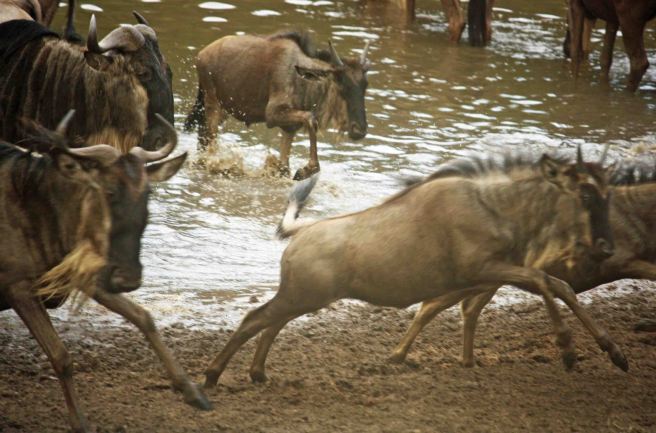 It helped that DonQui managed to time his visit to coincide with the Wildebeest migration. This was good luck rather than good management as the migration started a few months earlier than expected due to early rains.
It helped that DonQui managed to time his visit to coincide with the Wildebeest migration. This was good luck rather than good management as the migration started a few months earlier than expected due to early rains.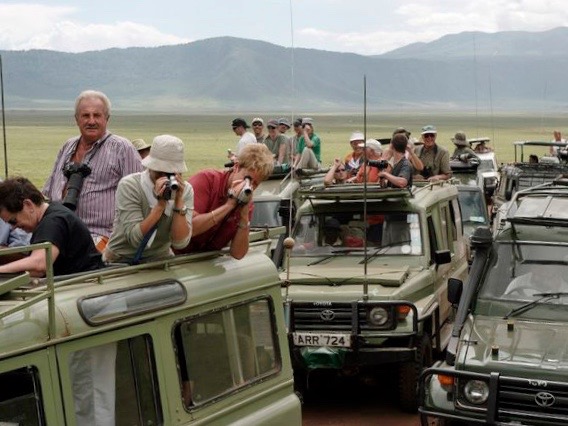

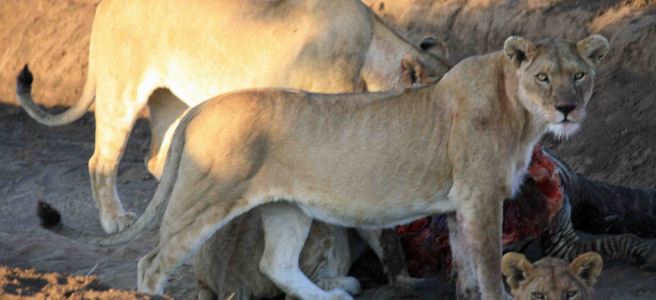
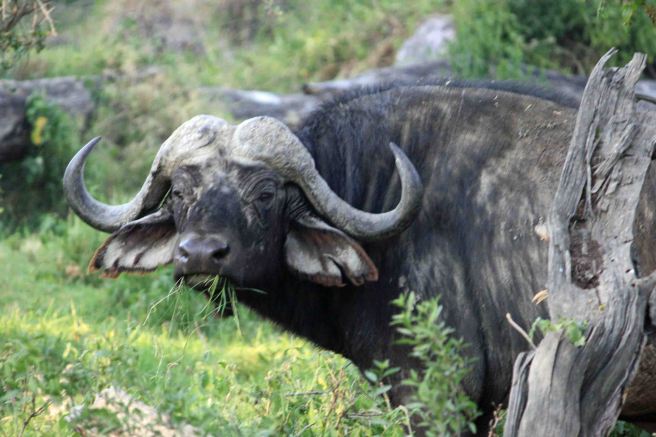


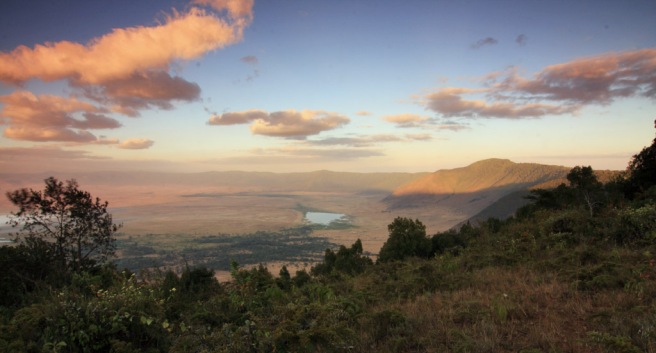



















 Sembe cake with fish paté. The fish is shredded rather than compressed in a paté. It is served under a parsley salad and on top of a small sembe cake, which reminds DobQui of a soft biscuit. The flavours are delicate, and deliciously enhanced with a light citrus dressing.
Sembe cake with fish paté. The fish is shredded rather than compressed in a paté. It is served under a parsley salad and on top of a small sembe cake, which reminds DobQui of a soft biscuit. The flavours are delicate, and deliciously enhanced with a light citrus dressing.
















































